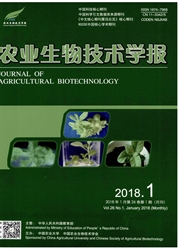

 中文摘要:
中文摘要:
微拟球藻(Nannochloropsis sp.)是一类具有巨大开发潜力的经济微藻,其规模化养殖多以室外跑道池为主。低温成为影响微拟球藻产量和品质的主要限制性因素之一。水杨酸(salicylic acid,SA)可以增强植物的低温耐受性。本研究将25℃下培养至对数生长中期的微拟球藻转至低温(15℃)胁迫处理96h。依水杨酸终浓度和培养温度不同,共分5个组(”25℃+SA0”,“15℃+SAO”,“15℃+SA5”,“15℃+SA15”和“15℃+SA25”组)。测定5个时间点(0,24,48,72和96h)上藻液光密度、可溶性糖、可溶性蛋白、丙二醛含量、脂肪酸组成及3条脂肪酸去饱和酶基因(△5,△6和△12去饱和酶基因)的转录水平变化。结果显示,低温胁迫下,微拟球藻生长受到抑制;而外源水杨酸能够促进低温胁迫下微拟球藻的生长,并使其可溶性糖、可溶性蛋白含量显著提高,丙二醛含量显著下降,不饱和脂肪酸相对百分含量显著增加,并以15mg/L效果最佳。比较“15℃+SA0”和“15℃+SA15”组中3条脂肪酸去饱和酶基因转录水平变化,发现外源水杨酸促进了A5和A6去饱和酶基因转录,但并未明显促进A12去饱和酶基因转录。可见,水杨酸能够增加其细胞内渗透调节物质,减少膜脂过氧化程度,提高不饱和脂肪酸含量以维持膜流动性,最终缓解低温给微拟球藻带来的伤害,提高其低温抗逆性。本研究首次探索了水杨酸对微拟球藻低温抗逆的影响,为微拟球藻的优化培养与抗逆研究提供了理论依据,具有重要的理论意义和经济价值。
 英文摘要:
英文摘要:
Nannochloropsis is a kind of economic microalgae with great development potential and its large- scale farming mainly depends on outdoor raceway pond. Low temperature becomes one of main limiting factors which affect the yield and quality of Nannochloropsis. Salicylic acid (SA) can enhance the low temperature resistance of many plants. This study transferred N. oceanica cells (25℃, mid-logarithmic phase) to low temperature (15℃) stress for 96 h. According to the difference of final concentrations of salicylic acid and cultivation temperature, the experiment was divided into 5 groups ("25 ℃+SA0", "15℃+SA0", "15 ℃+ SA5", "15 ℃+SA15" and "15℃+SA25"). The cell density, soluble sugar, soluble protein, malondialdehyde (MDA) content, fatty acid composition and transcript levels of 3 fatty acid desaturase genes (△5 desaturase, △ 6 desaturase and △12 desaturase) were determined of 5 time points (0, 24, 48, 72 and 96 h). The results showed that growth of N. oceanica was inhibited under low temperature stress, while exogenous salicylic acid could promote its growth even though not exceed the group under normal cultivation temperature (25 ℃). Soluble sugar, soluble protein and MDA contents were compared between groups "15℃+SA0", "15 ℃+SA5" and "15℃ + SA15". The results showed that SA could significantly increase its soluble sugar and soluble protein content, decline its MDA content, greatly augment the percentage of unsaturated fatty acids. The best effect emerged under the condition of 15 mg/L salicylic acid. The transcript levels of 3 fatty acid desaturase gene were also analyzed of groups "15℃ + SA0" and "15℃ + SA 15". The results indicated that the transcript levels of △5 desaturase and △6 desaturase were decreased in N. oceanica under low temperature stress, while exogenous SA could ease the effect of low temperature stress and enhance the transcript levels of △5 desaturase and △6 desaturas
 同期刊论文项目
同期刊论文项目
 同项目期刊论文
同项目期刊论文
 期刊信息
期刊信息
